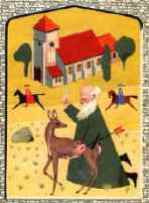


REFLECTIONS
These pieces are written each month by members of our clergy team.
February Leader
The 2nd February is Candlemas, which officially marks the end of the Christmas season. In some ways, I appreciate this slightly longer, more drawn-out approach to Christmas, as by the 2nd of February I feel we are finally able to take stock of not just what Christmas means, but of what actually happened last year. For St Nicholas Church, 2025 was a year when a number of significant changes took place within our building. We may sometimes wonder how the ‘fabric’ connects to the spiritual life of the church. I am reminded of the book of Haggai, where a prophet finds himself exhorting the people of God on their return from exile, with the temple in urgent need of repair. In the midst of these circumstances, God calls to the people to ‘go up into the mountains and bring down timber and build my house, so that I may take pleasure in it and be honoured’ (Haggai 1:8). As much as bricks and mortar may seem far removed from our spiritual lives, Haggai reminds us that as we look after the ‘house of God,’ he takes pleasure in it, and more than that – God is ‘honoured.’ Later on the prophet reminds the people that as God is honoured, or glorified, so he will ‘fill this house with glory’ and ultimately, in Haggai 2:9, he promises that ‘in this place I will grant peace’.So on a very practical level, as we sought to ‘honour God’ we finally installed high quality, up to date water heaters in our washrooms. These now ensure the supply of hot water on demand. Although this may seem a small thing, it is of course hugely significant for the hundreds of people who use our building on a weekly basis, and who in this day and age need the regular supply of hot water to thoroughly wash their hands. In addition, we replaced all the Fire Extinguishers throughout St Nicholas Church, ensuring that every single room in our building is now equipped with the latest and most suitable fire extinguishers, in line with the latest regulations and requirements. Undoubtedly the biggest project we undertook last year was to replace every single light fixture with LED lighting, from the smallest cupboard light bulb to the extensive ceiling lights covering our main hall. By one estimate, this will reduce our annual carbon footprint by approximately 2.7 tonnes a year. At the end of the year, we installed a defibrillator on the outside of our building for use by the church and the community. The British Red Cross state that ‘quick use of an Automated External Defibrillator (AED) can lead to survival rates of 50% to 70%’ for victims of cardiac arrest.* As a church we are very grateful for the individual donor who made provision of this defibrillator possible. In addition, we were grateful to Rochester Diocese for the provision of two significant grants towards the cost of the water heaters and LED lighting.
I draw some reassurance from the prophet Haggai that the improvements we make to a house intended for worship can in some way bring honour, or glory, to God, a glory that he promises to return to that house. Encouragingly, even with the various projects that improved our building in 2025, we were able to finish the year with a healthy surplus, with our own finances being in a much stronger position now than they have been for a number of years. So as the Christmas season draws to a close, and we move into the New Year, we look ahead to 2026 believing in God’s continuing provision for his people, continuing to pray that we may honour him, and to ask that ‘in this place he would grant peace’ (c.f. Haggai 2:9)
*https://www.redcrossfirstaidtraining.co.uk
Stephen Broadie
Reflection:
We are now in the Season of Epiphany. The word 'epiphany' means an intense showing, or manifestation and it refers to the revealing of Christ to the Wise Men as recorded in Matthew’s Gospel.
The Season of Epiphany then continues until 2nd February when the Church celebrates Candlemas, or the Presentation of Christ in the Temple. The following Sundays are known as the Sundays before Lent with the season of Lent beginning on Ash Wednesday, which this year comes rather early on Wednesday 18th February.
The main theme of Epiphany is the ongoing revelation of Jesus Christ as the Messiah and Son of God. It begins with the manifestation of Christ to the Wise Men, then the Baptism of Christ, then the recognition of Christ as the Messiah by the first disciples, then the beginning of Christ's public ministry as recorded in Matthew 4: 12 following, and finally the transformation of water into wine at the wedding of Cana, the first of Jesus’s signs, as recorded in John chapter 2.
In this bulletin I would like to share some reflections on the above passage which records Christ’s baptism. The first thing to say is that this event is clearly something of an embarrassment. John the Baptist had come out of the wilderness to call people to repentance and to convict them of their sins in no uncertain terms. In response to his preaching people came out in vast numbers to the river Jordan to be baptised and cleansed from their sins. How embarrassing it must have been for John when Jesus turned up in the queue!
Embarrassing and confusing because Jesus was the one who was sent to save the people from their sins, and as he was without sin, he therefore had no need for John’s baptism of repentance. So what was Jesus doing? In coming for baptism Jesus was doing two things. Firstly, Jesus was standing in solidarity with all of us in our lostness and sin. He is with us in all our struggles and reaches out to us in our failure and fallenness. God is not pointing a condemning finger at us from a distance and leaving us to flounder on our own, but in Christ the love of God comes to us, helps us and ultimately saves us from sin and all that goes with it. Secondly, Jesus is baptised to affirm his status as God’s Son. Notice in the above passage that immediately after his baptism God declares:
‘This is my Son, the beloved One, in whom I am well pleased’
This voice from heaven is accompanied by the presence of the Holy Spirit descending as a dove upon Jesus as he emerges from the river Jordan. Here is a profound manifestation (epiphany), not only of Jesus as God’s Son, but of the blessed Trinity, the Father, the Son and the Holy Spirit. Here is God sending his Son to save us from sin, and the language of love between the Father and the Son, namely the Holy Spirit hovering over the whole scene as a dove.
All physical life starts through water. The breaking of the waters of the womb is a sign that the baby is now ready to be born. The baby emerges into life through water, at one stage we all emerged from the darkness of the womb into the light of the world, from the isolation of being, to the warmth of our mother’s love and body. Similarly through baptism we are once again born through water, but this time it is a spiritual birth, we emerge from the darkness of sin into the light of Christ, from isolation into the warm love of God, Father, Son and Holy Spirit; from aloneness into the family of the Church. In this sense the Season of Epiphany marks not only certain historical events in the life of Jesus, but the ongoing scope for the Epiphany of Christ in our everyday lives. When we are lost in sin and struggling, Jesus is with us, when we are isolated he is with us, when we are feeling down and unhappy with ourselves, Christ reminds us that we are loved and blessed as a child of God. Although our lives are punctuated with memorable occasions, family gatherings, holidays and special experiences, generally life is routine, somewhat humdrum and ordinary. In the normality of our short lives we should be awake and alive to the possibility of 'epiphany' moments - times when the love of God is made clear and known to us. These epiphanies will probably come to us when we least expect them and from surprising quarters. In this sense words from the American Poet Mary Oliver in her poem Sometimes come to mind:
‘Instructions for living a life; Pay attention, be astonished. Tell about it’
MatthewABOUT ST. GILES CHURCH
Monthly Bulletins
It has now been 5 years since we started sending out our monthly Bulletin as a result of the Covid pandemic and I know from various feedback that the Bulletin is very much appreciated. Going forward I remain very committed to making sure that all of us who love St. Giles are kept informed not only of what is going on at our Church but encouraged in the understanding and practice of the Christian faith.In the future we will continue to write to you but every other month making sure that our bulletins coincide with the important occasions in the Church's year. Our next Bulletin will be sent out in July.
Matthew Hughes, May 2025